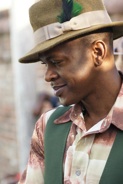
The Irish are alive and well in Jamaica, writes Rob Mullally. The third and final part of a three-part series.
Right down to the present day, the Irish are still making their mark upon Jamaica. Sir Alexander Bustamante, for example, was a national hero, founder of the Jamaica Labour Party, the nation’s first prime minister, and one of Jamaica’s best loved and most colorful political figures. He used to boast that he was fifty percent Irish, fifty percent Jamaican and ten percent Arawak. If that’s not Irish, I don’t know what is!
The father of Norman Washington Manley married the postmistress at Porus in Manchester. She was the daughter of a man named Shearer, who was the son of an immigrant from northern Ireland. Her mother was previously married to Clarke, for whom Alexander Clarke, or Bustamante, was the eldest son. Bustamante and Norman Manley were cousins and went on to found Jamaica’s two great political parties. If ever a man could have been said to have kissed the Blarney Stone and have “the gift of the gab,” it was the Right Honorable Michael Manley, twice Prime Minister of Jamaica and president of the People’s National Party.
Claude McKay, that great Jamaican radical poet, also of Irish descent, wrote at the height of the Black and Tan War, “I suffer with the Irish. I think I understand the Irish. My belonging to a subject race entitles me to some understanding of them.”
The late John Hearne, writer extraordinaire, was also proud of his Gaelic ancestry. The late Custos of Trelawny, Val Parnell, claimed ancestry with a great Irish patriot, Charles Stewart Parnell. Parnell, of course, organized protests against evictions of small farmers and advocated that the people shun any person who took part in such evictions. The Irishman’s first target was a land agent in County Mayo, one Captain Charles Boycott. The latter has now passed into history, or infamy.
The Brownes of Busha Browne fame (legends in authentic Jamaican food production), Tryall Estate, and the Marquess of Sligo, are alive and kicking at YS Farms in St. Elizabeth -- and still breeding great horses. A Browne has now married a Lanigan, joining two great Jamirish families.
The McConnells of Bog Walk and United Estates have worked the land for over 300 years in sugar, rum, and citrus.
There are still some Irish priests, nuns and teachers.
Many of Jamaica’s finest doctors and surgeons studied at the Royal College of Surgeons in Dublin. They did not return empty-handed. Doctors Williams, Bernard, Brown, and the late Custos of St. James, as well as Dr. Tomlinson all took a liking to the local colleens!
One of the world’s foremost authorities on coral reefs is Dublin native Ivan Goodbody, a retired professor of zoology at Kingston’s University of the West Indies (UWI, for short).
Freemasonry’s Irish Lodge is a vibrant part of the lives of many Jamaican male folk.
That Jamaica did not only receive “saints and scholars” can be seen from a report from the “Gleaner” in 1842. It complains that the Irish who settled in Jamaica in March of 1841 are “repeatedly intoxicated, drink excessively, are seen emerging from grog shops very dissolute and abandoned, and are of very intemperate habits!”
The leading trainer in the sport of kings is Phillip Feanny, whose mother Molly is from County Cork, and who learned his craft from Vincent O’Brien in Tipperary and at the Irish National Stud in Kildare.
Neil McCann and Fruit Importers of Ireland, owners of Fyffes, are shareholders in Eastern and Victoria Banana Estates, and distribute a significant amount of Jamaican produce in the UK. Guinness PLC, which had its origins in Dublin, now owns Red Stripe/D&G, which operates the largest brewery in the Caribbean. Jamaica’s dominant mobile phone service provider, Digicel, is very much an Irish-owned company, and there are strong bonds between JAMPRO and the IDA in Dublin.
There are many, many other comparisons between Jamaica and Ireland. Both are small island-states; both suffered under the same colonial master for hundreds of years. Both countries experienced massive emigration, and both won their independence in the same century, Ireland becoming independent some 40 years earlier. The success of “The Celtic Tiger” is now well known, and it is my fervent wish that Jamaica follow in its footsteps.
You see there is much more to us than Irish potatoes, or spuds as we both call them, or ganzies for t-shirts, or Kerry Gold butter, or Irish moss, which both peoples use as a tonic. Well, let’s not get into that. One of the Rastafarians favorite expressions is “Irie,” meaning everything is “jus cool.” ... I would love to say that this too is Irish, but that might be pushing my luck a little too far.
There is more of the Irish in Jamaicans than perhaps they realize, and more of the Jamaican in us than we care to admit. It’s there in our accents, our love of laughter, of wine, women and song. It’s present in our love affair with the turf and horses -- and the gambling that goes with it. It’s there in our shared fondness for Arthur Guinness and John Barleycorn, and our willingness to live for the moment and let tomorrow look after itself. These are the traits that others readily identify in both nations and why at home and abroad we are “bredren!”
![[Irish Republican News]](https://republican-news.org/graphics/title_gifs/rn.gif)
![[Irish Republican News]](https://republican-news.org/graphics/title_gifs/harp.gif)

